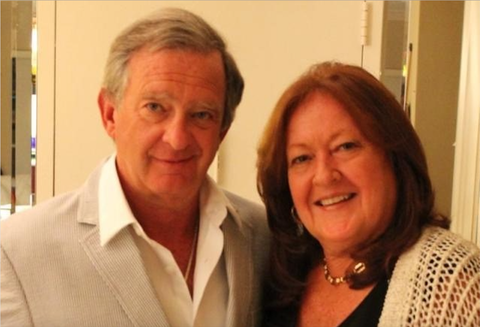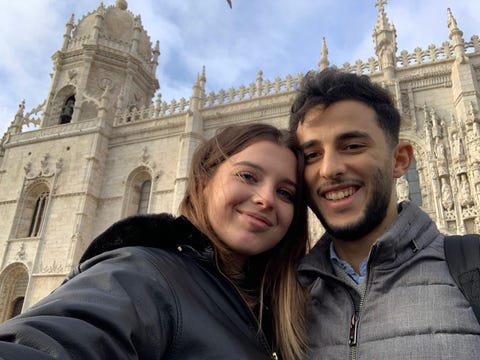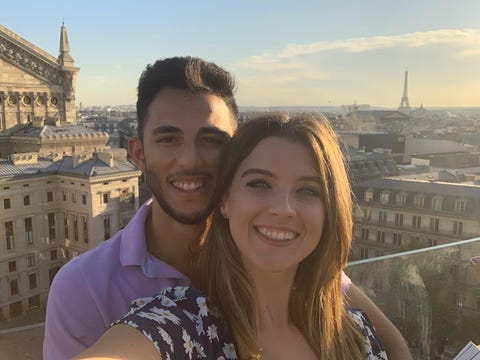When Rhys started dating Maddi in January, he had certain expectations about what hurdles they may have to face: different values; backgrounds; maybe some scheduling issues. He definitely wasn’t expecting a global pandemic.
Under regular circumstances, the pair are both based in New York City, just a few stops over the East River from each other. Now, Rhys has moved out of his law school dorm to complete online classes at his sister’s apartment in Midtown Manhattan, and Maddi has gone home to Connecticut to work remotely surrounded by family.
“We did not realize that we would not see each other again indefinitely until after we had both temporarily abandoned our living situations,” Rhys says. “Not knowing when I will see my significant other again is a tough pill to swallow, and it has taken from me the joy and excitement of seeing how our relationship would have continued to bloom under normal circumstances.”
Self-isolation comes with a lot of challenges—among them, being separated from the people you love the most. We talked to couples who are quarantining separately for various reasons, some of whom have no idea when they’ll be able to see each other in person again. And while they’ve found creative ways to stay connected, they explain the pain that has come along with it.

After 47 years of marriage, two children, and two grand-children, Rosie thought she and her husband Earl had experienced just about everything. But, after traveling with her daughter to the U.S. (they’re based in Canada), she now faces two weeks of isolation from him, unable to share a home with him for the first time in almost half a century.
The past few months, Earl was at Rosie’s side helping her recuperate from a knee injury—a fact that makes the distance even more obvious and painful. “It’s been a long battle with this knee thing getting better, so I was on crutches for months and he basically did everything for me,” Rosie says. “It’s not that I miss him more because he did everything for me, but because he’s really taken care of me during this time.”
Dr. Lori Whatley, PsyD, clinical psychologist and author of Connected & Engaged, says it’s “a difficult time because of the uncertainty.”
“Humans love certainty—we think we must have it. But we don’t,” she says. “It just feels mighty good. And so we have to be able to recall the times we were with our partner and how they felt so good and know that we will have them again.”

For Taha and his girlfriend Kelly, a bit of absence is the norm for them—she’s based in the U.S. and he’s in Paris—but they typically see each other every six weeks for a chunk of time. Kelly was set to spend the month of April in Paris, until the spread of COVID-19 led to border closures.
“I have no idea when I’m going to see him again. His entire country is shut down,” Kelly says. “The airline industry is taking massive hits right now, most international flights are cancelled, and that’s something that’s scary and hard to deal with, but we’re trying to keep things normal.”
The distance was even more painful when Taha began experiencing a fever and couldn’t get medical attention. Taha was never able to confirm if he had the novel coronavirus, as the high demand for tests has left them reserved for critical situations.
“She was calling me every now and then to comfort me and to make me feel good,” Taha says. “Usually we speak when she is on her break from work. I’m on sick leave for 15 days, so I’m always available when she calls me. I hope we get through this and we will.” To keep the mood light, they also send each other funny memes and videos.

“If you’re quarantining away from your partner, it can put a strain on an already stressful situation,” says Claire Barber, a certified mental health consultant and relationship expert. “Be kind to yourself and be kind to each other during this time. Go easy on your partner and take extra care to give them the benefit of doubt when you feel conflict rising. This will not only help your relationship while in quarantine but will hopefully have lasting positive effects.”
One way Taha and Kelly do this is by sharing prayers from their respective religions. “He’s Muslim and I’m pretty much Christian, so we send each other stuff to share about how to pray and that helps a lot during this time,” Kelly says. “That’s something we recently started doing and I enjoy that.” The couple also plans to video chat with Kelly’s family, who she’s currently staying with, to create a further sense of normalcy.
Sex and relationship therapist Shadeen Francis suggests other couples take Kelly and Taha’s lead. “Include one another in your lives: share links to things you’ve seen, capture moments they might enjoy, or mail them a token of your affection,” she says. “Talk about things other than your distance or news updates. While being informed is important, hyper-focusing on data actually takes you out of the present moment or the development of your relationship.”

While Taha and Kelly are familiar with distance, Matthias and Alex aren’t. For the past three years of dating, they’ve gotten used to seeing each other at least once during the week and on most weekends. Now, he’s in Jersey City, she’s in Brooklyn, and they’re no longer able to see each other in person: Matthias lives with his dad, who’s in his early 60s, and Alex’s roommate still has to go in for work every day.
“The sense of collective responsibility, and weight of personal guilt, for other people’s lives, my dad’s included, was enough to not relocate and encourage Alex to do the same,” Matthias says.
They’re used to FaceTiming each other, but now that it’s their main way of communicating with everyone in their lives, it’s starting to feel repetitive. “I think it has made me a bit tired of the format of remote communication, because it’s happening more often with more people and it’s less specific to our relationship,” Matthias says. “I freelance and I am usually by myself, working alone and not talking to anybody, except for Alex. There’s some fatigue with talking to more people at times that I usually have to myself, or just me and Alex. I miss being in a room with Alex and nobody assuming where I am or that I’m free to talk.”
Alex feels the same. “A few times, there hasn’t really been much to say anyway, since neither of us has been doing much during the day—or we’ve already rehashed the details of the day four times to four other people and are just kind of over it,” she says. “We’re trying to figure out other ways to engage with each other. Some days we’ve FaceTimed while doing other stuff on our own just to feel connected in that way, but it can’t compare.”
It’s important to communicate these kinds of struggles, Barber says—and it may even strengthen your relationship. “If you and your partner are in quarantine separately, take it as an opportunity to reassess your boundaries and improve your communication,” she says. “Speak to each other about your current needs, and how you would like them to be fulfilled given the current situation.”

As for communication, Rosie says FaceTime has helped her feel connected to Earl as he rides out the quarantine period at their younger daughter’s place. “The difference between just talking on the phone and actually seeing the person’s face—it really helps to connect you.”
Sometimes, it can also make her worried: “There was a day or two when he wasn’t feeling as great, and you can see it,” she says. “It’s one thing when you talk to somebody and they try and sort of fool you into thinking they’re doing fine. But, when you’re using FaceTime, you can really see how that person’s doing.”
Francis suggests using FaceTime to maintain “some degree of normalcy” during these times: “If you had usual routines with one another—going to bed together, sharing a meal, or watching a television show—work to preserve these rituals as ways to stay connected.”
For Rosie and Earl, this means connecting around dinner, as well as engaging in digital group activities. A favorite of theirs is the Facebook group “Choir Choir Choir,” where people can sing along to songs in real-time virtually. Rosie and Earl participate with FaceTime open, as a way to feel like they’re still doing it together.
Rhys and Maddi now rely on texts, phone calls, video chats, and silly Snapchats to strengthen and grow their relationship from afar. “We are fortunate to both have great communication skills, and even though he is not physically with me right now—our relationship is based on trust,” Maddie says. “I can honestly say that we can weather any storm as long as we continue to communicate and support one another during this difficult time.”
Thanks to technology, Rhys feels like they’re “far apart, but never distant.”
“We text throughout the day, take moments to call each other between pajama-clad bouts with work, and take great strides to stay finely attuned to the stresses each other feels,” he says. “For that feeling of security and support, I cannot be grateful enough.”
Source: Read Full Article





